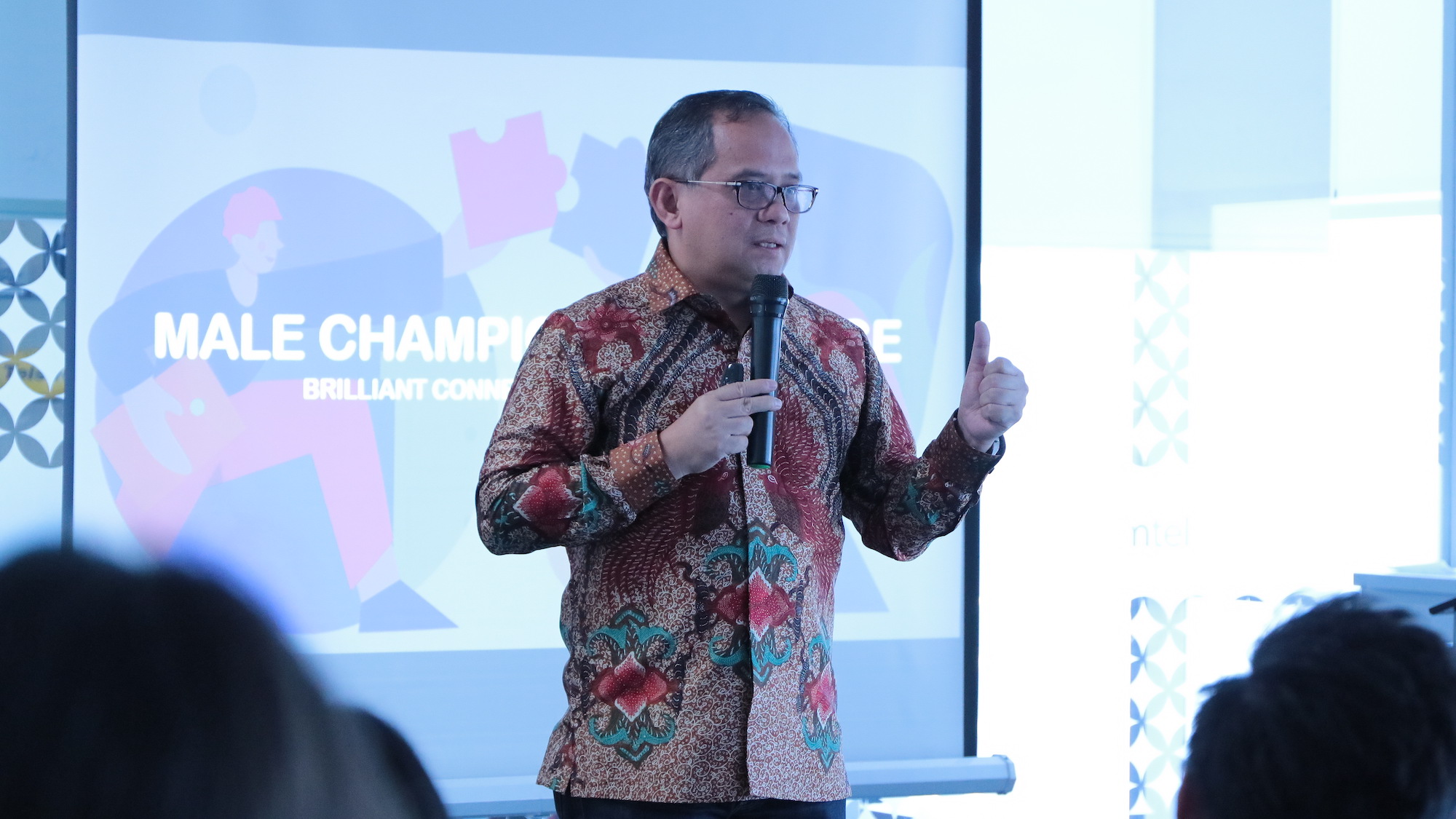The problem of gender equality in the world of employment has began to catch the global attention of corporations, including in Indonesia. The vigorous promotion of gender equality initiatives within organizations has succeeded in changing the priorities of current company policies. Increasingly, more and more companies are becoming aware of prioritizing gender equality to encourage inclusivity, as well as increase productivity, profitability, and customer satisfaction.
The results of an International Labor Organization (ILO) research report entitled “Stepping Toward Success: Business Success for Women in Business and Management in Indonesia”[i] shows that companies in Indonesia reported better business outcomes as gender equality initiatives increased.
The report revealed that around 77 percent of the 400 Indonesian companies that took part in the survey benefited from gender diversity in their businesses. 66 percent of respondents reported an increase in profits and productivity, as well as greater creativity, innovation, and openness. 61 percent cited increased capabilities and retained talent, while 53 percent reported an improvement in company reputation, and 46 percent cited better ability to meet customer needs.
Companies that reported increased profitability as a result of gender diversity initiatives experienced a measurable increase in profits. Of the companies in Indonesia that reported greater profitability, 32 percent reported a 5-10% increase in profits, and another 18% reported a 15-20% increase in profits.
The research report was developed through a collaborative effort between the ILO, Investing Women, the Indonesian Business Coalition for Women’s Empowerment (IBCWE), and the Indonesian Employer’s Association (APINDO), funded by the Australian government, J.P Morgan, and the ILO Bureau for Employer’s Activities. The report, published in June 2020, was developed based on the 2019 ILO Global Survey, which covered 13,000 companies in 70 countries, including 400 Indonesian companies.
The increased awareness of gender equality revealed by the ILO research report is encouraging. However, there is still room for improvement, especially considering the many challenges that still exist within the issue of gender equality relating to deep-rooted cultural practices and traditions, gender bias in wages, and the dual burden placed on female workers. The issue of participation and the representation of women in top positions of corporate leadership is also interesting to observe.
The survey conducted by the ILO examined women’s representation at four managerial levels. Of the companies surveyed in Indonesia, 61 percent had women in first-line managerial (supervisor) positions, 70 percent had women in middle manager positions, 49 percent had women in senior management positions, and only 22 percent had women in top leadership positions (top executives).
The relatively low number of women represented in top executive positions is one issue that needs to be addressed. In addition, another crucial problem related to the issue of gender equality is the low participation of women in the field of Information Technology, especially in relation to STEM (Science, Technology, Engineering, and Mathematics).
When further investigated, the number of female students studying STEM is quite high. However, when you take a look at the work environment in the IT sector, women’s participation is extremely low. Only 20% of all professional female workers work in the IT industry. This creates a gender gap and gender inequalities between men and women. This gap is evident, for example, in the recruitment of “fresh graduates” being dominated by men and also during promotions to middle management and more senior positions, there is an assumption that men are more suitable for work in the IT field and for more senior positions. This is extremely detrimental to women and is a threat to gender equality in the workplace. The ability to work should be based on real performance, and not based on gender. This is a real issue that we currently face and corporations must respond more proactively moving forward.
Telkomtelstra, which is engaged in the IT sector, has taken the initiative to provide more opportunities for women to pursue careers within the company and minimize gender discrimination in the workplace as much as possible through various programs. Telkomtelstra has created several distinct programs and policies to support gender equality in the workplace.
In 2016, Telkomtelstra launched the Pledge for Parity program, which was designed to motivate individual employees and Telkomtelstra as a company to take concrete steps in supporting gender equality in the workplace. The broad outline of the 5 programs was: to ensure those female candidates were always included in the interview process to fill all key/senior company positions; to increase the number of women employees in departments/functions where the percentage of women was still small compared to men; to provide facilities for nursing mothers in the office, and to implement the option of flexible working hours, including the option to work from home; and a policy for husbands to work from home for 2 weeks to support their wives post-labor. Of the 5 major programs launched in 2016, Telkomtelstra successfully implemented and achieved the targets of 4 programs, while the program on increasing the percentage of women engaged in work (departments/functions) such as the IT department and operation and delivery function, is still in the process of improvement.
Regarding the flexible working hour policy, Telkomtelstra employees are expected to be able to manage their working hours according to their individual needs, without hindering the quality of the work itself. Employees who arrive at the office earlier in the morning will be able to leave earlier and vice versa. One of the benefits of this policy for women employees is that they can adjust their working hours to suit their family needs. Those who need more time for their families and for other needs in the morning can choose to arrive at the office later, but will return home later in the afternoon. Or vice versa, employees who want to spend more time with their families in the afternoons can choose to start work earlier. One part of the flexible working hour policy is the policy for employees to work from home, which can be used by obtaining prior approval from the respective line manager. This policy has been in place since 2017 and is very helpful for employees when they are required to be at home and at the same time are able to complete the work expected of them by the company. One of the benefits of this policy is to create a level playing field between male and female employees, considering the dual burden placed on women, most of whom are also required to take care of household needs, as is the current situation in Indonesia. The work from home policy can help company employees maintain their careers while also carrying out other tasks related to their family life. These two policies have been extremely beneficial for Telkomtelstra in facing the COVID-19 pandemic. During the initial phase of the pandemic, 100% of Telkomtelstra staff worked from home, and 80% of Telkomtelstra workers are still working from home to reduce the risk of being exposed to the COVID-19 virus.
As stated earlier, the percentage of women working in the IT industry stands at around 20%. In 2016, in the framework of its gender equality initiative, Telkomtelstra set a target of having 30% of all employees being women. Currently, that target has been exceeded, with the number of women employees reaching 35% of all employees. However, in the IT and operations department, the number of women remains at 27%, which is below the 30% target, despite being above the average percentage in the IT industry of 20%.
In addition to
its policies, Telkomtelstra also has various programs to support gender
equality initiatives. For example, International
Women’s Day, Brilliant connected women, the White Ribbon Campaign, mentoring
sessions for female employees, the Indonesian Women Forum in collaboration with
other multinational companies, becoming a member of the IBCWE, forging close
collaborations with the National Commission on Violence Against Women (Komnas
Perempuan) and Telkom University, signing the Women Empowerment Principles with
UN Women in 2019, the Youth Takeover, and also collaborating with the Society
of Women Engineers. For one of these programs, Brilliant Connected Women, Telkomtelstra
has invited women who are successful professionals and entrepreneurs to share
their experiences with Telkomtelstra employees. We believe that through sharing
their experiences, they are able to inspire and motivate female employees at
Telkomtelstra. To date, 30 events have been held involving speakers from
Indonesia and overseas. These experience sharing events are conducted via video
conference if the speakers are overseas and during the COVID-19 pandemic, the
events have continued via video conference.
The various programs and policies in the
framework of gender equality are fully supported by the top leaders in
Telkomtelstra. The top leaders of the company realize that gender equality is
not just an issue for women, but is something that all people need to support,
and that support from men is very much needed. The government, the private sector,
and the public must stand up and work together to support policies and programs
in the framework of gender equality in the workplace and the role of women in
advancing business and the economy in Indonesia.(*)
[i] ILO Research Brief titled “Stepping Toward Success: Business Success for Women in Business and Management in Indonesia”, June 2020.
*This article was written by Ernest V. Hutagalung, Chief Financial Officer – Telkomtelstra


